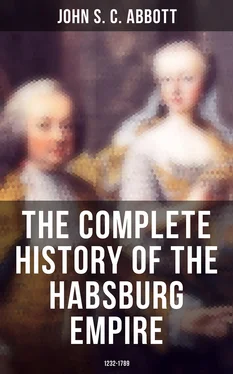1 ...7 8 9 11 12 13 ...25 Bordering on Poland there was a grand duchy of immense extent, Lithuania, embracing sixty thousand square miles. The Grand Duke Jaghellon was a burly Northman, not more than half civilized, whose character was as jagged as his name. This pagan proposed to the Polish nobles that he should marry Hedwige, and thus unite the grand duchy of Lithuania with the kingdom of Poland; promising in that event to renounce paganism, and embrace Christianity. The beautiful and accomplished Hedwige was horror-struck at the proposal, and declared that never would she marry any one but William.
But the Polish nobles, dazzled by the prospect of this magnificent accession to the kingdom of Poland, and the bishops, even more powerful than the nobles, elated with the vision of such an acquisition for the Church, resolved that the young and fatherless maiden, who had no one to defend her cause, should yield, and that she should become the bride of Jaghellon. They declared that it was ridiculous to think that the interests of a mighty kingdom, and the enlargement of the Church, were to yield to the caprices of a love-sick girl.
In the meantime William, all unconscious of the disappointment which awaited him, was hastening to Cracow, with a splendid retinue, and the richest presents Austrian art could fabricate, to receive his bride. The nobles, however, a semi-barbaric set of men, surrounded him upon his arrival, refused to allow him any interview with Hedwige, threatened him with personal violence, and drove him out of the kingdom. Poor Hedwige was in anguish. She wept, vowed deathless fidelity to William, and expressed utter detestation of the pagan duke, until, at last, worn out and broken-hearted, she, in despair, surrendered herself into the arms of Jaghellon. Jaghellon was baptized by the name of Ladislaus, and Lithuania was annexed to Poland.
The loss of the crown of Poland was to Leopold a grievous affliction; at the same time his armies, engaged in sundry measures of aggrandizement, encountered serious reverses. Leopold, the father of William, by these events was plunged into the deepest dejection. No effort of his friends could lift the weight of his gloom. In a retired apartment of one of his castles he sat silent and woful, apparently incapacitated for any exertion whatever, either bodily or mental. The affairs of his realm were neglected, and his bailiffs and feudal chiefs, left with irresponsible power, were guilty of such acts of extortion and tyranny, that, in the province of Suabia the barons combined, and a fierce insurrection broke out. Forty important towns united in the confederacy, and secured the co-operation of Strasburg, Mentz and other large cities on the Rhine. Other of the Swiss provinces were on the eve of joining this alarming confederacy against Leopold, their Austrian ruler. As Vienna for some generations had been the seat of the Hapsburg family, from whence governors were sent to these provinces of Helvetia, as Switzerland was then called, the Swiss began to regard their rulers as foreigners, and even Leopold found it necessary to strengthen himself with Austrian troops.
This formidable league roused Leopold from his torpor, and he awoke like the waking of the lion. He was immediately on the march with four thousand horsemen, and fourteen hundred foot, while all through the defiles of the Alps bugle blasts echoed, summoning detachments from various cantons under their bold barons, to hasten to the aid of the insurgents. On the evening of the 9th of July, 1396, the glittering host of Leopold appeared on an eminence overlooking the city of Sempach and the beautiful lake on whose border it stands. The horses were fatigued by their long and hurried march, and the crags and ravines, covered with forest, were impracticable for the evolutions of cavalry. The impetuous Leopold, impatient of delay, resolved upon an immediate attack, notwithstanding the exhaustion of his troops, and though a few hours of delay would bring strong reinforcements to his camp. He dismounted his horsemen, and formed his whole force in solid phalanx. It was an imposing spectacle, as six thousand men, covered from head to foot with blazing armor, presenting a front of shields like a wall of burnished steel, bristling with innumerable pikes and spears, moved with slow, majestic tread down upon the city.
The confederate Swiss, conscious that the hour of vengeance had come, in which they must conquer or be miserably slain, marched forth to meet the foe, emboldened only by despair. But few of the confederates were in armor. They were furnished with such weapons as men grasp when despotism rouses them to insurrection, rusty battle-axes, pikes and halberts, and two-handed swords, which their ancestors, in descending into the grave, had left behind them. They drew up in the form of a solid wedge, to pierce the thick concentric wall of steel, apparently as impenetrable as the cliffs of the mountains. Thus the two bodies silently and sternly approached each other. It was a terrific hour; for every man knew that one or the other of those hosts must perish utterly. For some time the battle raged, while the confederates could make no impression whatever upon their steel-clad foes, and sixty of them fell pierced by spears before one of their assailants had been even wounded.
Despair was fast settling upon their hearts, when Arnold of Winkelreid, a knight of Underwalden, rushed from the ranks of the confederates, exclaiming—
"I will open a passage into the line; protect, dear countrymen, my wife and children."
He threw himself upon the bristling spears. A score pierced his body; grasping them with the tenacity of death, he bore them to the earth as he fell. His comrades, emulating his spirit of self-sacrifice, rushed over his bleeding body, and forced their way through the gate thus opened into the line. The whole unwieldy mass was thrown into confusion. The steel-clad warriors, exhausted before the battle commenced, and encumbered with their heavy armor, could but feebly resist their nimble assailants, who outnumbering them and over-powering them, cut them down in fearful havoc. It soon became a general slaughter, and not less than two thousand of the followers of Leopold were stretched lifeless upon the ground. Many were taken prisoners, and a few, mounting their horses, effected an escape among the wild glens of the Alps.
In this awful hour Leopold developed magnanimity and heroism worthy of his name. Before the battle commenced, his friends urged him to take care of his own person.
"God forbid," said he, "that I should endeavor to save my own life and leave you to die! I will share your fate, and, with you, will either conquer or perish."
When all was in confusion, and his followers were falling like autumn leaves around him, he was urged to put spurs to his horse, and, accompanied by his body-guard, to escape.
"I would rather die honorably," said Leopold, "than live with dishonor."
Just at this moment his standard-bearer was struck down by a rush of the confederates. As he fell he cried out, "Help, Austria, help!" Leopold frantically sprang to his aid, grasped the banner from his dying hand, and waving it, plunged into the midst of the foe, with saber strokes hewing a path before him. He was soon lost in the tumult and the carnage of the battle. His body was afterward found, covered with wounds, in the midst of heaps of the dead.
Thus perished the ambitious and turbulent Leopold the 1st, after a stormy and unhappy life of thirty-six years, and a reign of constant encroachment and war of twenty years. Life to him was a dark and somber tempest. Ever dissatisfied with what he had attained, and grasping at more, he could never enjoy the present, and he finally died that death of violence to which his ambition had consigned so many thousands. Leopold, the second son of the duke, who was but fifteen years of age, succeeded his father, in the dominion of the Swiss estates; and after a desultory warfare of a few months, was successful in negotiating a peace, or rather an armed truce, with the successful insurgents.
Читать дальше












